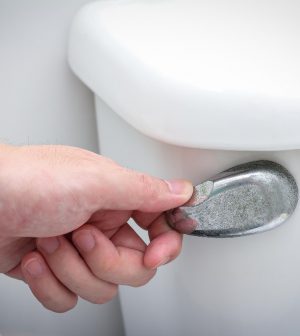- Could Your Grocery Store Meat Be Causing Recurring UTIs?
- Are You Making This Expensive Thermostat Error This Winter?
- Recognizing the Signs of Hypothyroidism
- 10 Strategies to Overcome Insomnia
- Could Artificial Sweeteners Be Aging the Brain Faster?
- Techniques for Soothing Your Nervous System
- Does the Water in Your House Smell Funny? Here’s Why
- Can a Daily Dose of Apple Cider Vinegar Actually Aid Weight Loss?
- 6 Health Beverages That Can Actually Spike Your Blood Sugar
- Treatment Options for Social Anxiety Disorder
Postpartum Urinary Incontinence Takes Physical, Mental Toll

Urinary incontinence is a common aftereffect of delivering a baby, but it can have a devastating effect on new moms, a new study warns.
These bladder leaks are significantly associated with anxiety and depression in new mothers, researchers discovered.
“If you have bad enough incontinence, you might feel isolated and embarrassed and have difficulty connecting socially,” said co-lead researcher Dr. David Rahn, a professor of obstetrics and gynecology at the University of Texas-Southwestern. “It’s not hard to imagine how urinary incontinence might lead to mental health struggles,”
For the study, researchers followed 419 new mothers participating in a new post-pregnancy care program in Dallas County.
About 1 in 3 women developed stress urinary incontinence, a condition where leakage occurs due to sudden movements like coughing, sneezing or jumping, results show.
Further, 1 in 6 women had urgency urinary incontinence, or leakage after experiencing a sudden and intense need to urinate, even if the bladder isn’t full.
And 1 in 9 women had overall bothersome urinary symptoms, researchers found.
Neither stress nor urgency incontinence was linked to traditional risk factors like large babies or complicated births, researchers said.
Instead, stress incontinence was associated with a mom’s higher BMI at birth and elevated depression scores, while urgency incontinence was associated with a higher number of previous births and elevated anxiety scores.
The new study was published recently in the journal Urogynecology.
Doctors performing postpartum care should routinely ask about incontinence and mental health, said co-lead researcher Dr. Sonia Bhandari Randhawa, a second-year urogynecology fellow at UT Southwestern Medical Center.
“It’s so important for providers to ask questions about urinary incontinence, depression, and anxiety, even if they don’t have time to discuss these topics in depth,” Bhandari Randhawa said in a university news release. “Having the right referral for these treatable conditions can make a huge difference in patients’ lives.”
More information
The University of Michigan has more about caring for your bladder during and after delivery.
SOURCE: University of Texas-Southwestern, news release, June 27, 2024
Source: HealthDay
Copyright © 2026 HealthDay. All rights reserved.










